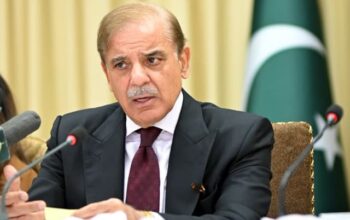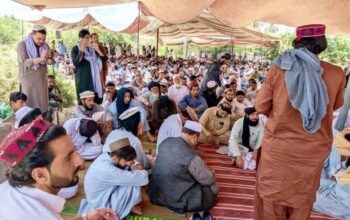By Staff Reporter
ISLAMABAD: Pakistan will dispatch a high-level delegation to Washington to contest a looming 29 percent US tariff on its goods, a policy threatening the nation’s fragile export-driven recovery, Finance Minister Muhammad Aurangzeb said on Saturday.
The tariff, layered atop a 10 percent duty effective April 5, will push the total levy on Pakistani exports to 39 percent starting April 9.
The US, Pakistan’s top export market, imported $5.44 billion in goods in 2024, with textiles—comprising nearly 90 percent of the total—most at risk. The country’s exports to the US rose 10 percent year-over-year to $4 billion in the first eight months of the current fiscal year, amplifying the stakes.
The tariffs stem from President Donald Trump’s “reciprocal tariffs” push to correct perceived trade imbalances, a policy rattling economies worldwide still rebounding from the pandemic and middle east and Ukraine crisis.
Prime Minister Shehbaz Sharif has tapped Aurangzeb to lead a steering committee of ministers, business figures, and academics to gauge the fallout and shape a response. A commerce secretary-led working group will back the effort. The government is racing to finalize a policy package for U.S. talks, with Aurangzeb expecting approval from Sharif within days.
Aurangzeb called the move a “challenge and an opportunity” to recalibrate trade ties with Washington.
“You should never let a good crisis go to waste,” Aurangzeb told reporters at a media briefing, signaling Islamabad’s intent to negotiate.
“We are looking at it both as a challenge and as an opportunity. On the opportunity side, it’s a relative value discussion in terms of what is happening at other locations and jurisdictions. And on the challenge side, what we can do in terms of the negotiations with the US administration.”
The minister underscored Pakistan’s aim to cement a “long-term strategic partnership” with the US. “In the next couple of days, we are going to finalize our recommendations to the prime minister and … with [his] approval … send a high-level delegation to Washington to get our views across and to ensure that we want to be … a long term strategic partner [with the US].”
Aurangzeb signaled a proactive stance, noting that a policy package is being developed to steer talks with US officials. “We want to make sure that we, in terms of our representations, put forward how we see [the tariff issue] in the medium to long term as a win-win situation for both Pakistan and the US,” he added.
Analysts warn the duties could undercut Pakistan’s edge, particularly if rivals like China, Bangladesh, and Vietnam—also hit by U.S. tariffs—pivot to Europe, crowding out Pakistani goods in key markets.
“We are very constructively engaged,” Aurangzeb said, voicing cautious optimism that dialogue could blunt the tariffs’ impact and bolster bilateral ties. With the April 9 deadline nearing, Pakistan is banking on diplomacy to avert a trade blow—and seize an opening.
Copyright © 2021 Independent Pakistan | All rights reserved




